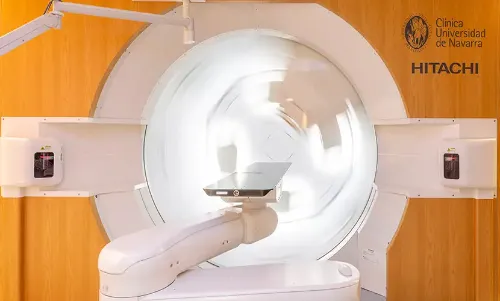Proton therapy for prostate cancer
Proton therapy is the most precise radiotherapy in the treatment of prostate cancer
Proton therapy is the most precise and least toxic external radiotherapy (it is the therapy that best preserves healthy tissues and reduces adverse effects). Since proton therapy is based on a different type of radiation to that of conventional radiotherapy, it improves the existing alternative.
It is a low-risk, non-invasive therapy with minimal toxicity to healthy surrounding tissues, which reduces adverse effects on urinary, erectile and intestinal function. In addition, its lower toxicity makes it possible to increase the dose of radiation and therefore reduce the number of treatment sessions.
Being integrated into the Clínica Universidad de Navarra, the Proton Therapy Unit benefits from the multidisciplinary treatment of cancer offered at the Clinic, the direct access to state-of-the-art imaging methods and the immediate support for the care of any medical specialty that the patient may require, as well as for any type of hospitalization.
Contact us if you need more information or advice on the checkup you need.

Advantages of proton therapy
Lower toxicity
It avoids short and long-term adverse effects on healthy tissues such as the bladder and rectum.
Greater precision
It releases high doses of radiation in a more precise way, reducing the treatment time.
Greater control
Minimizes the risk of post-treatment sexual impotence and preserves sphincter status (continence).
Proton Therapy Unit at the Clínica Universidad de Navarra
It incorporates the first Hitachi synchrotron in Europe, which is considered the most modern accelerator currently available

Radiotherapy is indicated in prostate cancer in the following cases:
- Localized prostate cancer in an advanced stage (high risk): in these cases, radiotherapy is the first treatment of choice.
- Localised prostate cancer (intermediate or low risk): Radiotherapy is a curative alternative indicated in localised prostate tumours.
- Disseminated and/or more aggressive tumours: radiotherapy is indicated in combination with hormone therapy.
- Recurrent prostate tumours: In these cases, proton therapy is a treatment of choice for tumours that have been previously irradiated with other radiotherapy modalities.
- Proton therapy in hypofractionation (5-10 sessions) is being explored as an alternative of socio-health efficiency.

Multi energy system
It changes the energy very quickly for the sweeping of the next treatment layer. In a short span of time, it coordinates with the patient's movement and achieves greater accuracy in depositing the dose.
The pencil beam
This is the most advanced version of proton therapy administration. This beam, approximately 1mm in diameter, runs through the tumour, releasing the dose in a way that sweeps it in layers until it is completely covered, depositing the programmed amount of dose at each point of the tumour.
Cone beam tomograph: in a 360º gantry
The integrated CT allows for checking the patient's positioning by making an automatic record with the planning CT. It accurately reproduces the situation of the tumour on the day of treatment.
SINCROTRÓN HITACHI
The most precise radiotherapy against tumor
The protons deposit their energy in successive layers in the tumor in a very fast way, achieving its destruction and repair by normal scar tissue.